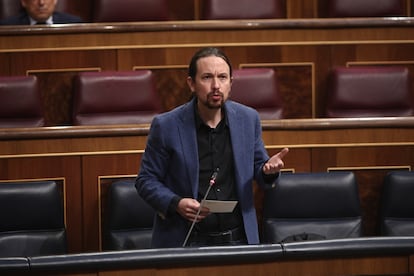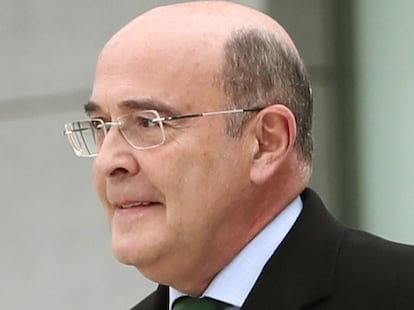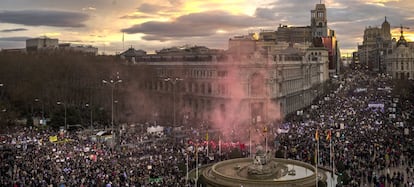Civil Guard dismissal sparks political row in Spain
Deputy PM asks opposition whether it is encouraging insubordination by the law enforcement agency, and PP spokeswoman calls him “the son of a terrorist”

The decision by Spain’s Interior Ministry to dismiss a top Civil Guard official in Madrid following the release of a damning report against the government has triggered an intense reaction that underscores how the coronavirus crisis has taken on political overtones.
The head of the Civil Guard command in Madrid, Colonel Diego Pérez de los Cobos, was sacked on Monday in a move that Interior Minister Fernando Grande-Marlaska described yesterday as part of “a reasonable, normal policy of building a new team.”
But the dismissal follows a report sent by the Civil Guard to a Madrid judge who is investigating alleged links between public events authorized by the government in early March and the spread of the coronavirus.
The Civil Guard’s second-in-command, Lieutenant General Laurentino Ceña, resigned shortly after learning of Pérez de los Cobos’ dismissal, and on Wednesday, a session inside Spanish Congress focused largely on the issue.

The Popular Party (PP), the center-right Ciudadanos (Citizens) and the far-right Vox demanded Grande-Marlaska’s resignation, calling him “unworthy,” “wretched” and “a traitor” to the Civil Guard and to his own values – a reference to the minister’s own 30-year career as a judge.
Members of the government were also criticized for their recent deal with Bildu, a radical Basque party with historic ties to the now-defunct terrorist group ETA. And the PP’s congressional spokeswoman, Cayetana Álvarez de Toledo, told Deputy PM Pablo Iglesias that “you are the son of a terrorist,” alluding to Iglesias’ father, who was “a member of FRAP” (Anti-Fascist Revolutionary and Patriotic Front, a radical leftist party that engaged in terrorist activities towards the end of Franco’s dictatorship.)
Prime Minister Pedro Sánchez, of the Socialist Party (PSOE), who heads a minority government in partnership with the leftist Unidas Podemos group, accused the PP conservatives of siding with the hard right. “If you act like Vox and you talk like Vox, we can infer that, if you are not the same thing, you are certainly acting like the far right,” he said.
Deputy PM Iglesias, who is the leader of Podemos, also accused the PP of encouraging insubordination within the Civil Guard. “Are you calling for the insubordination of the state’s forces? Be prudent, it’s our democracy that’s at stake,” he told the PP’s secretary general, Teodoro García Egea, after the latter charged the government with “staining the name of the Civil Guard.”
On February 23, 1981, armed Civil Guard officers led by Lieutenant-General Antonio Tejero stormed Congress in a failed coup, holding lawmakers hostage for 18 hours.
The report
The Civil Guard report was commissioned by Judge Carmen Rodríguez-Medel, who is investigating the government’s delegate in the Madrid region, José Manuel Franco of PSOE, for authorizing mass events in early March that may have helped spread the coronavirus. This included the feminist marches held on International Women’s Day, March 8.
The 83-page document, which EL PAÍS has seen, analyzed 177 public gatherings in the Madrid region between March 5 and 14, and concluded that “from March 5, 2020 onwards there should not have been any demonstrations” due to the health crisis.
But the report, which took two months to draft, also omitted relevant information, got important dates mixed up, offered erroneous contagion figures, and made reference to numerous false news.

In one instance, the authors claimed that authorities cancelled 12 demonstrations between March 5 and 14 due to health concerns, proving that the government already knew about the risk of coronavirus transmission. But there were no records of the telephone conversations in which government authorities allegedly informed organizers that their events were being cancelled. And nine of the organizers told this newspaper that this was not the case. “I wasn’t pressured by anyone. We cancelled the event ourselves, because we thought it would be ridiculous to march in front of an empty building,” said Diana Chnaiker, who had been planning a protest outside the Madrid regional parliament on March 12.
The feminist demonstration of March 8, which drew an estimated 120,000 people in Madrid, and other mass gatherings held that weekend were authorized by the government, which just a few days later decreed a state of alarm and introduced a national lockdown to fight the epidemic. Madrid has been the epicenter of the Covid-19 crisis in Spain.
On March 7, Spanish health authorities were still saying that the coronavirus situation was under control, based on figures provided by regional governments, which were reporting a few hundred cases, mostly in Madrid, La Rioja and the Basque province of Álava. In reality, a national epidemic was already underway but going undetected due to lack of testing. It was not until Monday, March 9, when the scenario officially changed.
That weekend, millions of people used public transportation, went to bars and restaurants and concerts, and even to political rallies: the far-right Vox held one that drew a crowd of 9,000. They also took part in the feminist marches on Sunday. Experts consulted by this newspaper said that the public gatherings played no more than a marginal role in the spread of the coronavirus, compared with other activities such as the use of public transportation.
The phone calls
Sources close to Colonel Diego Pérez de los Cobos say the latter began to get telephone calls on Sunday afternoon regarding the report that his subordinates had sent the Madrid judge in charge of the investigation. There were three calls, according to these sources: one from the colonel’s direct superior, General José Antonio Berrocal, one from the head of operations command, General Fernando Santafé, and a third at around 10.30pm from the director general of the Civil Guard herself, María Gámez, who informed De los Cobos of his dismissal without even calling him to her office. “There was never any attempt to learn the contents of anything,” said sources at the law enforcement agency.
English version by Susana Urra.
Tu suscripción se está usando en otro dispositivo
¿Quieres añadir otro usuario a tu suscripción?
Si continúas leyendo en este dispositivo, no se podrá leer en el otro.
FlechaTu suscripción se está usando en otro dispositivo y solo puedes acceder a EL PAÍS desde un dispositivo a la vez.
Si quieres compartir tu cuenta, cambia tu suscripción a la modalidad Premium, así podrás añadir otro usuario. Cada uno accederá con su propia cuenta de email, lo que os permitirá personalizar vuestra experiencia en EL PAÍS.
¿Tienes una suscripción de empresa? Accede aquí para contratar más cuentas.
En el caso de no saber quién está usando tu cuenta, te recomendamos cambiar tu contraseña aquí.
Si decides continuar compartiendo tu cuenta, este mensaje se mostrará en tu dispositivo y en el de la otra persona que está usando tu cuenta de forma indefinida, afectando a tu experiencia de lectura. Puedes consultar aquí los términos y condiciones de la suscripción digital.








































